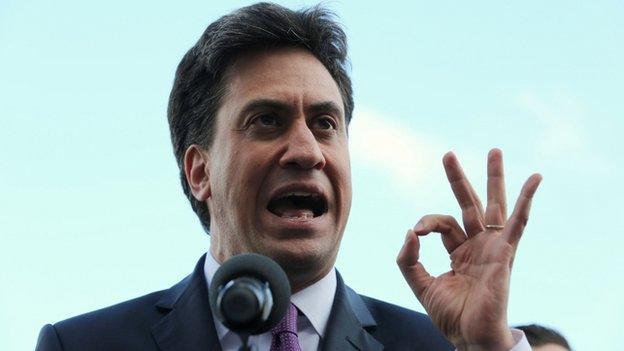Has Miliband said a proper sorry?
- Published
- comments

This morning on the Today programme, Ed Miliband prayed in aid Sir Nick Macpherson when repeating his view that the big economic mistake of the last Labour government was a failure to regulate the banks properly, rather than to spend too much.
Sir Nick is the Treasury's permanent secretary, the second most powerful civil servant in the land and the person on whom George Osborne as chancellor relies most for fiscal counsel and the execution of his policies.
In a review of a book on austerity, external by Bill Keegan, the doyen of Keynesian economic commentators, Sir Nick wrote: "The 2008 crisis was a banking crisis pure and simple. Excessive risk had built up in the system; the regulators failed to appreciate the scale of that risk or to address it.
"It was 'a failure of the Group of Seven economic policymaking establishment', myself included. Inevitably, countries with bigger banking sectors, notably the UK, were worse affected."
Or to put it another way, Sir Nick is putting his hands up and admitting that he and the rest of economic decision-making elite in the rich developed countries were blinkered to the crazy risks being taken by banks in the pursuit of profits and bonuses.
He is conceding that the UK Exchequer relied far too much on revenues generated by the bloated financial services sector: corporation taxes paid by banks on their bloated profits turned out to be unsustainable; equally ephemeral was capital gains tax and stamp duty generated by bubbles in the housing market and in financial securities, both of which were pumped up by banks' reckless provision of finance.
Structural deficit
This is to explain why when the Tories say that Labour overspent and Ed Miliband insists the UK's economic mess was all the fault of a global banking crisis, they are contradicting each other far less than may appear the case.
As I said on Friday, Gordon Brown and his economic advisers - who included Nick Macpherson from the impartial civil service, together with Ed Balls and Ed Miliband from his party - felt comfortable pushing up spending by four percentage points of GDP from 2000 to 2007, partly because of their optimism that the growth of the City and of tax revenues associated with that growth would not be a flash in the Exchequer pan.
Brown was wrong, as were Macpherson, Balls and Miliband.
That error has been given official status, as it were: with the benefit of hindsight, both the IMF and the OECD have calculated that the UK's cyclically adjusted deficit - the part of the gap between spending and revenues that normal growth won't eliminate - was bigger in the UK than in other big rich countries.
Thus according to the IMF, in 2007 the cyclically adjusted deficit was 5.3% in the UK, compared with 3.5% in the US and 3.7% in France. And one important reason for the UK's bigger so-called "structural" deficit was that financial services represents a massively bigger share of the UK economy than of the US economy and that of any other of our major competitors.
None of which is to let the Labour government of Brown, Miliband and Balls off the hook. They have to be held to account for making big and important long-term public spending commitments on the basis of money generated by a bloated banking sector that could not be relied upon.
That said, it is worth noting that only days before Northern Rock went kaput, and City euphoria evaporated, George Osborne as shadow chancellor was pledging to match the Labour government's promises, external to continue increasing public expenditure.
In other words, Osborne was in effect part of Sir Nick Macpherson's blinkered economic establishment.
Even so, it doesn't make Brown, Miliband and Balls less culpable that Osborne also failed to identify that the government was living beyond its means.
They were in power, he wasn't. Which is why many voters seem to be saying that if Miliband and Balls want to pursue their argument that Cameron and Osborne have failed to restore living standards for millions, they need to make a better fist of accepting responsibility for the initial blow to those living standards.